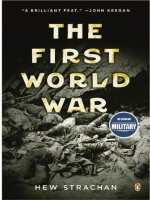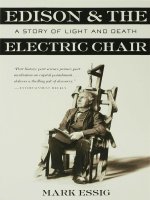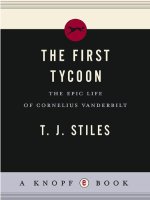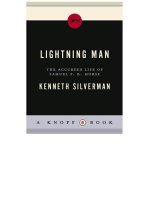Tim weiner legacy of ashes the history o CIA (v5 0)
Bạn đang xem bản rút gọn của tài liệu. Xem và tải ngay bản đầy đủ của tài liệu tại đây (3.2 MB, 548 trang )
Legacy of Ashes
Tim Weiner
CONTENTS
TITLE PAGE
DEDICATION
EPIGRAPH
AUTHOR'S NOTE
PART ONE | "In the Beginning, We Knew Nothing"
"The CIA Under Truman, 1945 to 1953
1. "INTELLIGENCE MUST BE GLOBAL AND TOTALITARIAN"
2. "THE LOGIC OF FORCE"
3. "FIGHT FIRE WITH FIRE"
4. "THE MOST SECRET THING"
5. "A RICH BLIND MAN"
6. "THEY WERE SUICIDE MISSIONS"
7. "A VAST FIELD OF ILLUSION"
PART TWO | A Strange Kind of Genius" The CIA Under Eisenhower, 1953 to 1961
8. "WE HAVE NO PLAN"
9. "CIA'S GREATEST SINGLE TRIUMPH"
10. "BOMB REPEAT BOMB"
11. "AND THEN WE'LL HAVE A STORM"
12. "WE RAN IT IN A DIFFERENT WAY"
13. "WISHFUL BLINDNESS"
14. "HAM-HANDED OPERATIONS OF ALL KINDS"
15. "A VERY STRANGE WAR"
16. "HE WAS LYING DOWN AND HE WAS LYING UP"
PART THREE | Lost Causes
The CIA Under Kennedy and Johnson, 1961 to 1968
17. "NOBODY KNEW WHAT TO DO"
18. "WE HAD ALSO FOOLED OURSELVES"
19. "WE'D BE DELIGHTED TO TRADE THOSE MISSILES"
20. "HEY, BOSS, WE DID A GOOD JOB, DIDN'T WE?"
21. "I THOUGHT IT WAS A CONSPIRACY"
22. "AN OMINOUS DRIFT"
23. "MORE COURAGE THAN WISDOM"
24. "THE BEGINNING OF A LONG SLIDE DOWNWARDS"
25. "WE KNEW THEN THAT WE COULD NOT WIN THE WAR"
26. "A POLITICAL H-BOMB"
27. "TRACK DOWN THE FOREIGN COMMUNISTS"
PART FOUR | Get Rid of the Clowns"
The CIA Under Nixon and Ford, 1968 to 1977
28. "WHAT THE HELL DO THOSE CLOWNS DO OUT THERE IN LANGLEY?"
29. "USG WANTS A MILITARY SOLUTION"
30. "WE ARE GOING TO CATCH A LOT OF HELL"
31. "TO CHANGE THE CONCEPT OF A SECRET SERVICE"
32. "A CLASSIC FASCIST IDEAL"
PHOTO INSERT
33. "THE CIA WOULD BE DESTROYED"
34. "SAIGON SIGNING OFF"
35. "INEFFECTIVE AND SCARED"
PART FIVE | Victory Without Joy
The CIA Under Carter, Reagan, and George H. W. Bush, 1977 to 1993
36. "HE SOUGHT TO OVERTHROW THEIR SYSTEM"
37. "WE WERE JUST PLAIN ASLEEP"
38. "A FREELANCE BUCCANEER"
39. "IN A DANGEROUS WAY"
40. "HE WAS RUNNING A GREAT RISK"
41. "A CON MAN'S CON MAN"
42. "TO THINK THE UNTHINKABLE"
43. "WHAT ARE WE GOING TO DO WHEN THE WALL COMES DOWN?"
PART SIX | The Reckoning
The CIA Under Clinton and George W. Bush, 1993 to 2007
44. "WE HAD NO FACTS"
45. "WHY IN THE WORLD DIDN'T WE KNOW?"
46. "WE'RE IN TROUBLE"
47. "THE THREAT COULD NOT BE MORE REAL"
48. "THE DARK SIDE"
49. "A GRAVE MISTAKE"
50. "THE BURIAL CEREMONY"
ACKNOWLEDGMENTS
NOTES
PHOTOGRAPHY CREDITS
ALSO BY TIM WEINER
COPYRIGHT
For Kate, Emma, and Ruby
There are no secrets that time does not reveal.
--Jean Racine, Britannicus (1669)
AUTHOR'S NOTE
Legacy of Ashes is the record of the first sixty years of the Central Intelligence Agency. It describes
how the most powerful country in the history of Western civilization has failed to create a first-rate
spy service. That failure constitutes a danger to the national security of the United States.
Intelligence is secret action aimed at understanding or changing what goes on abroad. President
Dwight D. Eisenhower called it "a distasteful but vital necessity." A nation that wants to project its
power beyond its borders needs to see over the horizon, to know what is coming, to prevent attacks
against its people. It must anticipate surprise. Without a strong, smart, sharp intelligence service,
presidents and generals alike can become blind and crippled. But throughout its history as a
superpower, the United States has not had such a service.
History, Edward Gibbon wrote in The Decline and Fall of the Roman Empire, is "little more than
the register of crimes, follies, and misfortunes of mankind." The annals of the Central Intelligence
Agency are filled with folly and misfortune, along with acts of bravery and cunning. They are replete
with fleeting successes and long-lasting failures abroad. They are marked by political battles and
power struggles at home. The agency's triumphs have saved some blood and treasure. Its mistakes
have squandered both. They have proved fatal for legions of American soldiers and foreign agents;
some three thousand Americans who died in New York, Washington, and Pennsylvania on September
11, 2001; and three thousand more who have died since then in Iraq and Afghanistan. The one crime
of lasting consequence has been the CIA's inability to carry out its central mission: informing the
president of what is happening in the world.
The United States had no intelligence to speak of when World War II began, and next to none a few
weeks after the war ended. A mad rush to demobilize left behind a few hundred men who had a few
years' experience in the world of secrets and the will to go on fighting a new enemy. "All major
powers except the United States have had for a long time past permanent worldwide intelligence
services, reporting directly to the highest echelons of their Government," General William J.
Donovan, the commander of the wartime Office of Strategic Services, warned President Truman in
August 1945. "Prior to the present war, the United States had no foreign secret intelligence service. It
never has had and does not now have a coordinated intelligence system." Tragically, it still does not
have one.
The CIA was supposed to become that system. But the blueprint for the agency was a hasty sketch.
It was no cure for a chronic American weakness: secrecy and deception were not our strengths. The
collapse of the British Empire left the United States as the sole force able to oppose Soviet
communism, and America desperately needed to know those enemies, to provide foresight to
presidents, and to fight fire with fire when called upon to light the fuse. The mission of the CIA,
above all, was to keep the president forewarned against surprise attack, a second Pearl Harbor.
The agency's ranks were filled with thousands of patriotic Americans in the 1950s. Many were
brave and battle-hardened. Some had wisdom. Few really knew the enemy. Where understanding
failed, presidents ordered the CIA to change the course of history through covert action. "The conduct
of political and psychological warfare in peacetime was a new art," wrote Gerald Miller, then the
CIA's covert-operations chief for Western Europe. "Some of the techniques were known but doctrine
and experience were lacking." The CIA's covert operations were by and large blind stabs in the dark.
The agency's only course was to learn by doing--by making mistakes in battle. The CIA then
concealed its failures abroad, lying to Presidents Eisenhower and Kennedy. It told those lies to
preserve its standing in Washington. The truth, said Don Gregg, a skilled cold-war station chief, was
that the agency at the height of its powers had a great reputation and a terrible record.
Like the American public, the agency dissented at its peril during the Vietnam War. Like the
American press, it discovered that its reporting was rejected if it did not fit the preconceptions of
presidents. The CIA was rebuked and scorned by Presidents Johnson, Nixon, Ford, and Carter. None
of them understood how the agency worked. They took office "with the expectation that intelligence
could solve every problem, or that it could not do anything right, and then moved to the opposite
view," notes a former deputy director of central intelligence, Richard J. Kerr. "Then they settled
down and vacillated from one extreme to the other."
To survive as an institution in Washington, the agency above all had to have the president's ear. But
it soon learned that it was dangerous to tell him what he did not want to hear. The CIA's analysts
learned to march in lockstep, conforming to conventional wisdom. They misapprehended the
intentions and capabilities of our enemies, miscalculated the strength of communism, and misjudged
the threat of terrorism.
The supreme goal of the CIA during the cold war was to steal Soviet secrets by recruiting spies,
but the CIA never possessed a single one who had deep insight into the workings of the Kremlin. The
number of Soviet spies with important information to reveal--all of them volunteers, not recruits-could be counted on the fingers of two hands. And all of them died, captured and executed by
Moscow. Almost all had been betrayed by officers of the CIA's Soviet division who were spying for
the other side, under Presidents Reagan and George H. W. Bush. Under Reagan, the CIA set off on
misconceived third-world missions, selling arms to Iran's Revolutionary Guards to finance a war in
Central America, breaking the law and squandering what trust remained reposed in it. More
grievously, it missed the fatal weakness of its main enemy.
It fell to machines, not men, to understand the other side. As the technology of espionage expanded
its horizons, the CIA's vision grew more and more myopic. Spy satellites enabled it to count Soviet
weapons. They did not deliver the crucial information that communism was crumbling. The CIA's
foremost experts never saw the enemy until after the cold war was over. The agency had bled the
Soviets by pouring billions of dollars of weapons into Afghanistan to help fight the Red Army's
occupying forces. That was an epic success. But it failed to see that the Islamic warriors it supported
would soon take aim at the United States, and when that understanding came, the agency failed to act.
That was an epochal failure.
The unity of purpose that held the CIA together during the cold war came undone in the 1990s,
under President Clinton. The agency still had people who strove to understand the world, but their
ranks were far too thin. There were still talented officers who dedicated themselves to serving the
United States abroad, but their numbers were far too few. The FBI had more agents in New York than
the CIA had officers abroad. By the end of the century, the agency was no longer a fully functioning
and independent intelligence service. It was becoming a second-echelon field office for the Pentagon,
weighing tactics for battles that never came, not strategies for the struggle ahead. It was powerless to
prevent the second Pearl Harbor.
After the attacks on New York and Washington, the agency sent a small skilled cadre of covert
operators into Afghanistan and Pakistan to hunt down the leaders of al Qaeda. It then forfeited its role
as a reliable source of secret information when it handed the White House false reports on the
existence of weapons of mass destruction in Iraq. It had delivered a ton of reportage based on an
ounce of intelligence. President George W. Bush and his administration in turn misused the agency
once proudly run by his father, turning it into a paramilitary police force abroad and a paralyzed
bureaucracy at headquarters. Bush casually pronounced a political death sentence upon the CIA in
2004 when he said that the agency was "just guessing" about the course of the war in Iraq. No
president had ever publicly dismissed the CIA that way.
Its centrality in the American government ended with the dissolution of the office of director of
central intelligence in 2005. Now the CIA must be rebuilt if it is to survive. That task will take years.
The challenge of understanding the world as it is has overwhelmed three generations of CIA officers.
Few among the new generation have mastered the intricacies of foreign lands, much less the political
culture of Washington. In turn, almost every president, almost every Congress, and almost every
director of central intelligence since the 1960s has proved incapable of grasping the mechanics of the
CIA. Most have left the agency in worse shape than they found it. Their failures have handed future
generations, in the words of President Eisenhower, "a legacy of ashes." We are back where we began
sixty years ago, in a state of disarray.
Legacy of Ashes sets out to show how it has come to pass that the United States now lacks the
intelligence it will need in the years ahead. It is drawn from the words, the ideas, and the deeds set
forth in the files of the American national-security establishment. They record what our leaders really
said, really wanted, and really did when they projected power abroad. This book is based on my
reading of more than fifty thousand documents, primarily from the archives of the CIA, the White
House, and the State Department; more than two thousand oral histories of American intelligence
officers, soldiers, and diplomats; and more than three hundred interviews conducted since 1987 with
CIA officers and veterans, including ten directors of central intelligence. Extensive endnotes amplify
the text.
This book is on the record--no anonymous sources, no blind quotations, no hearsay. It is the first
history of the CIA compiled entirely from firsthand reporting and primary documents. It is, by its
nature, incomplete: no president, no director of central intelligence, and certainly no outsider can
know everything about the agency. What I have written here is not the whole truth, but to the best of
my ability, it is nothing but the truth.
I hope it may serve as a warning. No republic in history has lasted longer than three hundred years,
and this nation may not long endure as a great power unless it finds the eyes to see things as they are
in the world. That once was the mission of the Central Intelligence Agency.
PART
ONE
"In the Beginning, We Knew Nothing"
The CIA Under Truman
1945 to 1953
1. "INTELLIGENCE
MUST BE GLOBAL AND
TOTALITARIAN"
All Harry Truman wanted was a newspaper.
Catapulted into the White House by the death of President Franklin D. Roosevelt on April 12,
1945, Truman knew nothing about the development of the atomic bomb or the intentions of his Soviet
allies. He needed information to use his power.
"When I took over," he wrote in a letter to a friend years later, "the President had no means of
coordinating the intelligence from around the world." Roosevelt had created the Office of Strategic
Services, under the command of General William J. Donovan, as America's wartime intelligence
agency. But Donovan's OSS was never built to last. When the new Central Intelligence Agency arose
from its ashes, Truman wanted it to serve him solely as a global news service, delivering daily
bulletins. "It was not intended as a 'Cloak & Dagger Outfit'!" he wrote. "It was intended merely as a
center for keeping the President informed on what was going on in the world." He insisted that he
never wanted the CIA "to act as a spy organization. That was never the intention when it was
organized."
His vision was subverted from the start.
"In a global and totalitarian war," General Donovan believed, "intelligence must be global and
totalitarian." On November 18, 1944, he had written to President Roosevelt proposing that the United
States create a peacetime "Central Intelligence Service." He had started sketching his plan the year
before, at the behest of Lieutenant General Walter Bedell Smith, chief of staff to General Dwight D.
Eisenhower, who wanted to know how the OSS would become part of the military establishment of
the United States. Donovan told the president that he could learn the "capabilities, intentions and
activities of foreign nations" while running "subversive operations abroad" against America's
enemies. The OSS had never been stronger than thirteen thousand members, smaller than a single
army division. But the service Donovan envisioned would be its own army, a force skillfully
combating communism, defending America from attack, and serving up secrets for the White House.
He urged the president to "lay the keel of the ship at once," and he aimed to be its captain.
Nicknamed "Wild Bill" after a fast but errant pitcher who managed the New York Yankees from
1915 to 1917, Donovan was a brave old soldier--he had won the Congressional Medal of Honor for
heroism in the trenches of France during World War I--but a poor politician. Very few generals and
admirals trusted him. They were appalled by his idea of making a spy service out of a scattershot
collection of Wall Street brokers, Ivy League eggheads, soldiers of fortune, ad men, news men, stunt
men, second-story men, and con men.
The OSS had developed a uniquely American cadre of intelligence analysts, but Donovan and his
star officer, Allen W. Dulles, were enthralled by espionage and sabotage, skills at which Americans
were amateurs. Donovan depended on British intelligence to school his men in the dark arts. The
bravest of the OSS, the ones who inspired legends, were the men who jumped behind enemy lines,
running guns, blowing up bridges, plotting against the Nazis with the French and the Balkan resistance
movements. In the last year of the war, with his forces spread throughout Europe, North Africa, and
Asia, Donovan wanted to drop his agents directly into Germany. He did, and they died. Of the twentyone two-man teams that went in, only one was ever heard from again. These were the kinds of
missions General Donovan dreamed up daily--some daring, some deluded.
"His imagination was unlimited," said his right-hand man, David K.E. Bruce, later the American
ambassador to France, Germany, and England. "Ideas were his plaything. Excitement made him snort
like a racehorse. Woe to the officer who turned down a project, because, on its face, it seemed
ridiculous, or at least unusual. For painful weeks under his command I tested the possibility of using
bats taken from concentrations in Western caves to destroy Tokyo"--dropping them into the sky with
incendiary bombs strapped to their backs. That was the spirit of the OSS.
President Roosevelt always had his doubts about Donovan. Early in 1945, he had ordered his chief
White House military aide, Colonel Richard Park, Jr., to conduct a secret investigation into the
wartime operations of the OSS. As Park began his work, leaks from the White House created
headlines in New York, Chicago, and Washington, warning that Donovan wanted to create an
"American Gestapo." When the stories broke, the president urged Donovan to shove his plans under
the rug. On March 6, 1945, the Joint Chiefs of Staff formally shelved them.
They wanted a new spy service to serve the Pentagon, not the president. What they had in mind was
a clearinghouse staffed by colonels and clerks, distilling information gathered by attaches and
diplomats and spies, for the benefit of four-star commanders. Thus began a battle for control of
American intelligence that went on for three generations.
"AN EXTREMELY DANGEROUS THING"
The OSS had little standing at home, and less inside the Pentagon. The organization was barred from
seeing the most important intercepted communications from Japan and Germany. Senior American
military officers thought an independent civilian intelligence service run by Donovan, with direct
access to the president, would be "an extremely dangerous thing in a democracy," in the words of
Major General Clayton Bissell, the assistant chief of staff for military intelligence.
These were many of the same men who had slept through Pearl Harbor. Well before dawn on
December 7, 1941, the American military had broken some of Japan's codes. It knew an attack might
be coming, but it never imagined Japan would take so desperate a gamble. The broken code was too
secret to share with commanders in the field. Rivalries within the military meant that information was
divided, hoarded, and scattered. Because no one possessed all the pieces of the puzzle, no one saw
the big picture. Not until after the war was over did Congress investigate how the nation had been
taken by surprise, and not until then was it clear that the country needed a new way to defend itself.
Before Pearl Harbor, American intelligence covering great swaths of the globe could be found in a
short row of wooden filing cabinets at the State Department. A few dozen ambassadors and military
attaches were its sole sources of information. In the spring of 1945, the United States knew next to
nothing about the Soviet Union, and little more about the rest of the world.
Franklin Roosevelt was the only man who could revive Donovan's dream of a far-seeing, allpowerful American intelligence service. When Roosevelt died on April 12, Donovan despaired for
the future. After sitting up half the night grieving, he came downstairs at the Ritz Hotel, his favorite
haunt in liberated Paris, and had a gloomy breakfast with William J. Casey, an OSS officer and a
future director of central intelligence.
"What do you think it means for the organization?" Casey asked.
"I'm afraid it's probably the end," Donovan said.
That same day, Colonel Park submitted his top secret report on the OSS to the new president. The
report, fully declassified only after the cold war ended, was a political murder weapon, honed by the
military and sharpened by J. Edgar Hoover, the FBI director since 1924; Hoover despised Donovan
and harbored his own ambitions to run a worldwide intelligence service. Park's work destroyed the
possibility of the OSS continuing as part of the American government, punctured the romantic myths
that Donovan created to protect his spies, and instilled in Harry Truman a deep and abiding distrust of
secret intelligence operations. The OSS had done "serious harm to the citizens, business interests, and
national interests of the United States," the report said.
Park admitted no important instance in which the OSS had helped to win the war, only mercilessly
listing the ways in which it had failed. The training of its officers had been "crude and loosely
organized." British intelligence commanders regarded American spies as "putty in their hands." In
China, the nationalist leader Chiang Kai-shek had manipulated the OSS to his own ends. Germany's
spies had penetrated OSS operations all over Europe and North Africa. The Japanese embassy in
Lisbon had discovered the plans of OSS officers to steal its code books--and as a consequence the
Japanese changed their codes, which "resulted in a complete blackout of vital military information" in
the summer of 1943. One of Park's informants said, "How many American lives in the Pacific
represent the cost of this stupidity on the part of OSS is unknown." Faulty intelligence provided by the
OSS after the fall of Rome in June 1944 led thousands of French troops into a Nazi trap on the island
of Elba, Park wrote, and "as a result of these errors and miscalculations of the enemy forces by OSS,
some 1,100 French troops were killed."
The report personally attacked Donovan. It said the general had lost a briefcase at a cocktail party
in Bucharest that was "turned over to the Gestapo by a Rumanian dancer." His hiring and promotion
of senior officers rested not on merit but on an old-boy network of connections from Wall Street and
the Social Register. He had sent detachments of men to lonely outposts such as Liberia and forgotten
about them. He had mistakenly dropped commandos into neutral Sweden. He had sent guards to
protect a captured German ammunition dump in France and then blown them up.
Colonel Park acknowledged that Donovan's men had conducted some successful sabotage missions
and rescues of downed American pilots. He said the deskbound research and analysis branch of OSS
had done "an outstanding job," and he concluded that the analysts might find a place at the State
Department after the war. But the rest of the OSS would have to go. "The almost hopeless
compromise of OSS personnel," he warned, "makes their use as a secret intelligence agency in the
postwar world inconceivable."
After V-E Day, Donovan went back to Washington to try to save his spy service. A month of
mourning for President Roosevelt was giving way to a mad scramble for power in Washington. In the
Oval Office on May 14, Harry Truman listened for less than fifteen minutes as Donovan made his
proposal to hold communism in check by undermining the Kremlin. The president summarily
dismissed him.
All summer long, Donovan fought back in Congress and in the press. Finally, on August 25, he told
Truman that he had to choose between knowledge and ignorance. The United States "does not now
have a coordinated intelligence system," he warned. "The defects and the dangers of this situation
have been generally recognized."
Donovan had hoped that he could sweet-talk Truman, a man he had always treated with cavalier
disdain, into creating the CIA. But he had misread his own president. Truman had decided that
Donovan's plan had the earmarks of a Gestapo. On September 20, 1945, six weeks after he dropped
America's atomic bombs on Japan, the president of the United States fired Donovan and ordered the
OSS to disband in ten days. America's spy service was abolished.
2 . "THE LOGIC OF
FORCE"
In the rubble of Berlin, Allen Dulles, the ranking OSS officer in Germany, had found a splendid and
well-staffed mansion for his new headquarters in the summer of 1945. His favorite lieutenant,
Richard Helms, began trying to spy on the Soviets.
"What you have to remember," Helms said half a century later, "is that in the beginning, we knew
nothing. Our knowledge of what the other side was up to, their intentions, their capabilities, was nil,
or next to it. If you came up with a telephone book or a map of an airfield, that was pretty hot stuff.
We were in the dark about a lot of the world."
Helms had been happy to return to Berlin, where he had made his name as a twenty-three-year-old
wire service reporter by interviewing Hitler at the 1936 Olympics. He was dumbstruck by the
abolition of the OSS. At the outfit's operations center in Berlin, a commandeered sparkling-wine
factory, the anger and alcohol flowed freely on the night the order from the president arrived. There
would be no central headquarters for American intelligence as Dulles had envisioned. Only a
skeleton crew would stay on overseas. Helms simply could not believe the mission could come to an
end. He was encouraged a few days later when a message arrived from OSS headquarters in
Washington, telling him to hold the fort.
"THE HOLY CAUSE OF CENTRAL INTELLIGENCE"
The message came from Donovan's deputy, Brigadier General John Magruder, a gentleman soldier
who had been in the army since 1910. He adamantly believed that without an intelligence service,
America's new supremacy in the world would be left to blind chance, or beholden to the British. On
September 26, 1945, six days after President Truman signed away the OSS, General Magruder
stalked down the endless corridors of the Pentagon. The moment was opportune: the secretary of war,
Henry Stimson, had resigned that week, and Stimson had been dead-set against the idea of a CIA.
"Seems to me most inadvisable," he had told Donovan a few months earlier. Now General Magruder
seized the opening left by Stimson's departure.
He sat down with an old friend of Donovan's, the assistant secretary of war, John McCloy, one of
the great movers and shakers of Washington. Together, the two men countermanded the president.
Magruder walked out of the Pentagon that day with an order from McCloy that said, "the continuing
operations of OSS must be performed in order to preserve them." That piece of paper kept the hope
for a Central Intelligence Agency alive. The spies would stay on duty, under a new name, the
Strategic Services Unit, the SSU. McCloy then asked his good friend Robert A. Lovett, the assistant
secretary for air war and a future secretary of defense, to set up a secret commission to plot the
course for American intelligence--and to tell Harry Truman what had to be done. Magruder
confidently informed his men that "the holy cause of central intelligence" would prevail.
Emboldened by the reprieve, Helms set to work in Berlin. He purged officers who had plunged
into Berlin's black market, where everything and everyone was for sale--two dozen cartons of
Camels, purchased for $12 at the American military PX, bought a 1939 Mercedes-Benz. He searched
for German scientists and spies to ferret out to the West, with the aim of denying their skills to the
Soviets and putting them to work for the United States. But these tasks soon took second place to the
struggle to see the new enemy. By October, "it was very clear our primary target was going to be
what the Russians were up to," remembered Tom Polgar, then a twenty-three-year-old officer at the
Berlin base. The Soviets were seizing the railroads and co-opting the political parties of eastern
Germany. At first the best the American spies could do was to try to track the movement of Soviet
military transports to Berlin, giving the Pentagon a sense that someone was trying to keep an eye on
the Red Army. Furious at Washington's retreat in the face of the Soviet advance, working against the
resistance from the ranking American military men in Berlin, Helms and his men began trying to
recruit German police and politicians to establish spy networks in the east. By November, "we were
seeing the total takeover by the Russians of the East German system," said Peter Sichel, another
twenty-three-year-old SSU officer in Berlin.
The Joint Chiefs of Staff and the forceful secretary of the navy, James V. Forrestal, now began to
fear that the Soviets, like the Nazis before them, would move to seize all of Europe--and then push on
to the eastern Mediterranean, the Persian Gulf, northern China, and Korea. One false move could lead
to a confrontation no one could contain. And as the fear of a new war increased, the future leaders of
American intelligence split into two rival camps.
One believed in the slow and patient gathering of secret intelligence through espionage. The other
believed in secret warfare--taking the battle to the enemy through covert action. Espionage seeks to
know the world. That was Richard Helms. Covert action seeks to change the world. That would be
Frank Wisner.
Wisner was the charming son of land-rich Mississippi gentry, a dashing corporate lawyer in a
tailored military uniform. In September 1944 he had flown into Bucharest, Romania, as the new OSS
station chief. The Red Army and a small American military mission had seized control in the capital,
and Wisner's orders were to keep an eye on the Russians. He was in his glory, conspiring with the
young King Michael, plotting the rescue of downed Allied airmen, and requisitioning the thirty-room
mansion of a Bucharest beer baron. Under its sparkling chandeliers, Russian officers mingled with the
Americans, toasting one another with Champagne. Wisner was thrilled--he was one of the first OSS
men to bend an elbow with the Russians--and he proudly reported to headquarters that he had made a
successful liaison with the Soviet intelligence service.
He had been an American spy for less than a year. The Russians had been at the game for more than
two centuries. They already had well-placed agents within the OSS and they quickly infiltrated
Wisner's inner circle of Romanian allies and agents. By midwinter, they took control of the capital,
herded tens of thousands of Romanians who had German bloodlines into railroad cars, and shipped
them eastward to enslavement or death. Wisner watched twenty-seven boxcars filled with human
cargo rolling out of Romania. The memory haunted him all his life.
He was a deeply shaken man when he arrived at OSS headquarters in Germany, where he and
Helms became uneasy allies. They flew to Washington together in December 1945, and as they talked
during the eighteen-hour journey, they realized they had no idea whether the United States would have
a clandestine service after they landed.
"AN APPARENTLY BASTARD ORGANIZATION"
In Washington, the battle over the future of American intelligence was growing fierce. The Joint
Chiefs of Staff fought for a service firmly under their control. The army and the navy demanded their
own. J. Edgar Hoover wanted the FBI to conduct worldwide espionage. The State Department sought
dominion. Even the postmaster general weighed in.
General Magruder defined the problem: "Clandestine intelligence operations involve a constant
breaking of all the rules," he wrote. "To put it baldly, such operations are necessarily extra-legal and
sometimes illegal." He argued, convincingly, that the Pentagon and the State Department could not
risk running those missions. A new clandestine service would have to take charge.
But almost no one was left to fill its ranks. "The intelligence collection effort more or less came to
a standstill," said Colonel Bill Quinn, General Magruder's executive officer at the Strategic Services
Unit. Five of every six OSS veterans had gone back to their old lives. They saw what was left of
American intelligence as "transparently jerry-built and transient," Helms said, "an apparently bastard
organization with an unpredictable life expectancy." Their number fell by nearly 10,000 in three
months, down to 1,967 by the end of 1945. The London, Paris, Rome, Vienna, Madrid, Lisbon, and
Stockholm stations lost almost all their officers. Fifteen out of twenty-three Asian outposts closed. On
the fourth anniversary of Pearl Harbor, convinced that Truman had run American intelligence off the
rails, Allen Dulles returned to his desk at Sullivan and Cromwell, the New York law firm where his
brother John Foster Dulles was a partner. Frank Wisner followed his lead and went back to his own
New York law firm, Carter, Ledyard.
The remaining intelligence analysts were dispatched to form a new research bureau at the State
Department. They were treated like displaced persons. "I don't suppose there had ever been or could
ever be a sadder or more tormented period of my life," wrote Sherman Kent, later a founding father of
CIA's directorate of intelligence. The most talented soon left in despair, back to their universities and
newspapers. No replacements appeared. There would be no coherent intelligence reporting in the
American government for many years to come.
President Truman had relied on his budget director, Harold D. Smith, to oversee the orderly
dismantling of the American war machine. But demobilization was turning into disintegration. Smith
warned the president on the day he dismembered the OSS that the United States was at risk of
returning to the state of innocence that had prevailed before Pearl Harbor. He feared that American
intelligence had become "royally bitched up." At a hastily convened White House meeting on January
9, 1946, Admiral William D. Leahy, Truman's crusty military chief of staff, bluntly told the president
that "intelligence had been handled in a disgraceful way."
Truman saw he had created a snafu and decided to set it straight. He summoned the deputy director
of naval intelligence, Rear Admiral Sidney W. Souers. A reservist, Souers was a Democratic Party
stalwart from Missouri, a wealthy businessman who made his money in life insurance and Piggly
Wiggly shops, the nation's first self-service supermarkets. He had served on a postwar commission
studying the future of intelligence created by Secretary of the Navy James Forrestal, but his sights
were set on nothing grander than a swift return to Saint Louis.
Souers discovered to his dismay that the president was going to make him the first director of
central intelligence. Admiral Leahy recorded the moment of the investiture in his office diary for
January 24, 1946: "At lunch today in the White House, with only members of the Staff present, RAdm
Sidney Souers and I were presented with black cloaks, black hats, and wooden daggers" by Truman.
The president then knighted Souers as chief of the "Cloak and Dagger Group of Snoopers" and
"Director of Centralized Snooping." This vaudeville act placed the flabbergasted reservist in
command of the misbegotten and short-lived organization called the Central Intelligence Group.
Souers was now in charge of nearly two thousand intelligence officers and support staff who
controlled files and dossiers on some 400,000 individuals. Many of them had no idea what they were
doing, or what they were supposed to do. Someone asked Souers after his swearing-in what he
wanted to do. "I want to go home," he said.
Like every director of central intelligence who followed him, he was given great responsibility
without equivalent authority. He had no direction from the White House. The trouble was that no one
really knew what the president wanted--least of all the president himself. Truman said he only needed
a daily intelligence digest, to keep from having to read a two-foot stack of cables every morning. It
seemed to the charter members of the Central Intelligence Group that it was the only aspect of their
work he ever considered.
Others saw the mission very differently. General Magruder maintained that there was a tacit
understanding at the White House that the Central Intelligence Group would operate a clandestine
service. If so, not a word of it appeared on paper. The president never spoke of it, so almost no one
else in the government recognized the new group's legitimacy. The Pentagon and the State Department
refused to talk to Souers and his people. The army, the navy, and the FBI treated them with the
deepest disdain. Souers lasted barely a hundred days as director, though he stayed on to serve the
president as an adviser. He left behind only one note of consequence, a top secret memo with the
following plea: "There is an urgent need to develop the highest possible quality of intelligence on the
USSR in the shortest possible time."
The only American insights on the Kremlin in those days came from the newly appointed American
ambassador in Moscow, the future director of central intelligence, General Walter Bedell Smith, and
his ranking Russia hand, George Kennan.
"WHAT DOES THE SOVIET UNION WANT?"
Bedell Smith was a shopkeeper's son from Indiana who rose from buck private to general without the
polish of West Point or a college degree. As Eisenhower's chief of staff in World War II, he had
thought through every battle in North Africa and Europe. His fellow officers respected and feared
him; he was Ike's unsmiling hatchet man. He worked himself beyond exhaustion. After receiving
blood transfusions for a bleeding ulcer when he collapsed at the end of a late dinner with Eisenhower
and Winston Churchill, he argued his way out of a British hospital and back to his commander's tent.
He had broken bread with Russian military officers, sitting down for awkward dinners at Allied
headquarters in Algiers to plan joint operations against the Nazis. He had personally accepted the
Nazi surrender that ended the war in Europe, staring down with contempt at the German command in
the battered little red schoolhouse in Rheims, France, that served as the American military's forward
headquarters. On V-E Day, May 8, 1945, he had met for a few fleeting minutes in Rheims with Allen
Dulles and Richard Helms. Dulles, cursed by gout, hobbling on a crutch, had come to see Eisenhower
and win his approval for the creation of an all-powerful American intelligence center in Berlin. Ike
had no time for Dulles that morning--a bad omen.
Bedell Smith arrived in Moscow in March 1946 to be schooled by George Kennan, the charge
d'affaires at the American embassy. Kennan had spent many years in Russia, many dark hours trying to
decipher Joseph Stalin. The Red Army had seized almost half of Europe in the war, a prize taken at
the terrible price of twenty million Russian dead. Its forces had liberated nations from the Nazis, but
now the shadow of the Kremlin was falling over more than 100 million people beyond Russia's
borders. Kennan foresaw that the Soviets would hold their conquests by brute strength. He had
warned the White House to prepare for a showdown.
A few days before Bedell Smith landed in Moscow, Kennan unleashed the most famous cable in
the history of American diplomacy, the "long telegram," an eight-thousand-word portrait of Soviet
paranoia. Kennan's readers--at first a few, in time millions--all seemed to seize on a single line: the
Soviets were impervious to the logic of reason but highly sensitive to "the logic of force." In short
order, Kennan would gain fame as the greatest Kremlinologist in the American government. "We had
accustomed ourselves, through our wartime experience, to having a great enemy before us," Kennan
reflected many years later. "The enemy must always be a center. He must be totally evil."
Bedell Smith called Kennan "the best possible tutor a newly arrived chief of mission could have
had."
On a cold, starry night in April 1946, Bedell Smith rode a limousine flying the American flag into
the fortress of the Kremlin. At the gates, Soviet intelligence officers checked his identity. His car
passed the ancient Russian cathedrals and the huge broken bell at the foot of a tall tower within the









